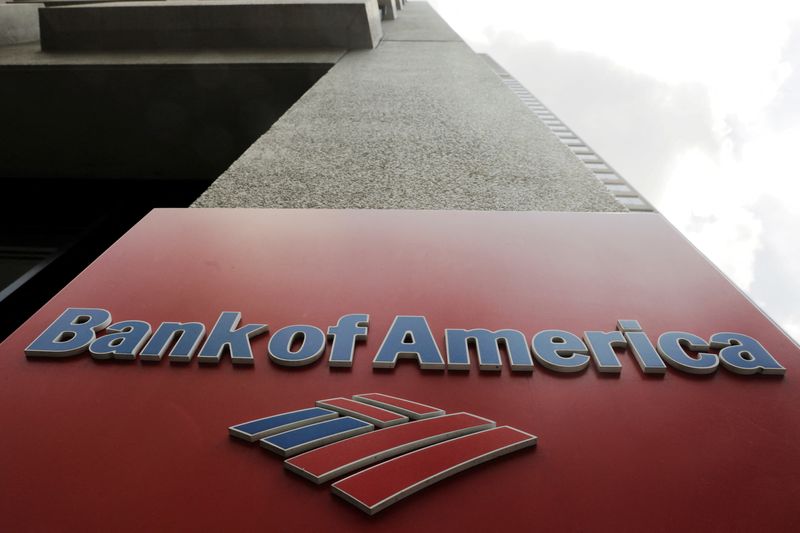By David Henry
NEW YORK (Reuters) - Wall Street bankers have long talked about how higher interest rates will deliver additional revenue from loans and higher-yielding securities.
Now that rates are rising, bankers must confront the downside: as yields rise the bonds they already own lose value and erode their capital.
For the biggest U.S. banks, this means less excess capital to fund share buybacks. Fewer buybacks mean less growth in earnings per share, which puts more pressure on stock prices.
The S&P Banks Index has declined by 11% since the start of the year, almost double the 6% decline of the benchmark S&P 500 over the same period.
"You're going to see a lot lower buybacks than you did last year in the U.S. banking system," said bank analyst Charles Peabody of Portales Partners.
Bank of America Corp (NYSE:BAC) could show one of the biggest capital declines from falling bond prices when banks start reporting quarterly results next week, analysts said, since it moved more aggressively than others to invest extra cash in securities last year.
"I'm pretty sure you will see that they have slowed their buybacks considerably in the first quarter and primarily due to this issue," Peabody said.
Bank of America declined to comment.
DOUBLE-EDGED SWORD
The lost capital should eventually be compensated by higher rates improving net interest income. But the timing is inconvenient for buybacks, analysts said.
"Rising interest rates are a double-edged sword for the banks," Jefferies analyst Ken Usdin wrote in a report.
In the first quarter, yields on 10-year U.S. Treasury notes rose 0.83 of a percentage point to 2.34%. A full 1-point increase would have shaved Bank of America's Common Equity Tier 1 capital ratio, a key regulatory measure, to 10.2% from 10.6%, Usdin estimated.
That would leave the bank close to the 10% to 10.5% level that Bank of America executives have said the bank will maintain to keep a cushion over its 9.5% requirement from regulators.
Citigroup Inc (NYSE:C) would have had its CET1 ratio reduced by 0.22 of a point while JPMorgan Chase & Co (NYSE:JPM) would have seen a 0.15-point cut, Usdin.
Citigroup and JPMorgan have additional reasons to reduce buybacks, Peabody noted. Citigroup probably will have to take some losses on its Russian assets and it has said those could rise to nearly $5 billion in a "severe" scenario.
JPMorgan CEO Jamie Dimon said in a letter to shareholders on Monday that his bank's buybacks "will be lower in the next year or so" because it faces higher capital requirements and needs to invest in businesses it recently acquired.
When banks post results, analysts will examine how each one has changed its mix of cash and securities to increase interest income and managed the risk of unrealized losses on securities.
Banks have been taking steps to reduce damage from the unrealized losses, including hedging holdings as Bank of America does.
Banks can also make an accounting choice that tempers the risk. They can classify some bonds as "held-to-maturity" (HTM) and not be required to count changes in value if they commit to keep the securities until they are repaid.
Or, banks can keep the bonds as "available-for-sale," (AFS) which means having to count unrealized losses against capital but being free to sell the securities, such as to raise money to make more loans.
Bank securities portfolios have shifted to 47% held-to-maturity from 28% two years ago, according to Usdin.
Most banks are small enough that regulators don't require them to count the changes in AFS securities toward their capital requirements.
Whether AFS or HTM, the unrealized losses do not reduce earnings.

Peabody expects investors will focus more on changes in capital in coming quarters if bond prices continue to fall. That's because changes in capital, also known as book value, can be a better indicator than earnings of whether companies are creating value for shareholders or piling up losses to be realized later.
Usdin estimated that book value per share for 20 banks he covers would decline an average of 4% with a 1 percentage point increase in 10-year yields.